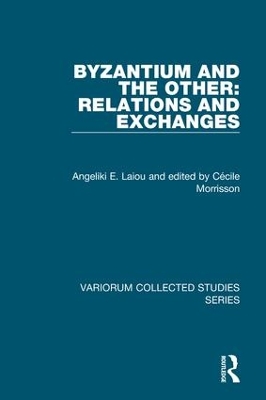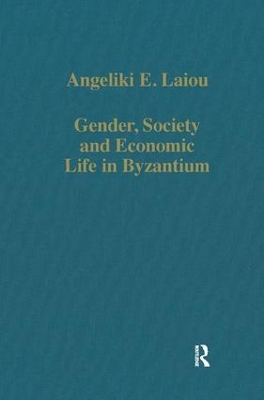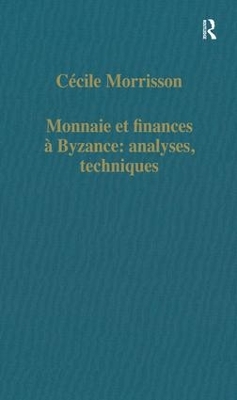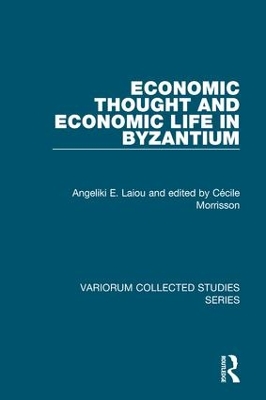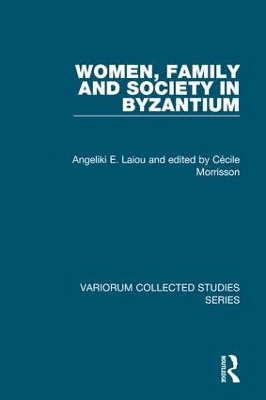Variorum Collected Studies
5 total works
Byzantium and the Other: Relations and Exchanges
by Angeliki E. Laiou and Ms Cecile Morrisson
Published 14 September 2012
Angeliki Laiou (1941-2008), one of the leading Byzantinists of her generation, broke new ground in the study of the social and economic history of the Byzantine Empire. Byzantium and the Other: Relations and Exchanges, the second of three volumes to be published posthumously in the Variorum Collected Studies Series, brings together fourteen articles published between 1982 and 2012 that reflect her enduring interest in Byzantium's political, ideological, and commercial relations with its neighbours. The first three articles examine Byzantine attitudes and institutional responses to foreigners and strangers within the empire, while the next four concern Byzantium's response to the Crusades and, more generally, to questions of justice in the spheres of conflict and colonisation. The final seven articles investigate Byzantium's political and commercial relations with other regional and Mediterranean powers; particular emphasis is placed on Venice and Genoa, whose increasing involvement in the Byzantine economy so marked the final centuries of the empire's existence.
The studies in this volume reflect the author’s interest in history as it was lived: not only the social and economic structures, but the men and women, collectively and individually, who made them function. The role of women in Byzantine economy and society is found to be much more important than had been believed; their participation in trade and manufacturing is established, as is the role of aristocratic women in the economic affairs of the household; the question of female literacy is also discussed. Two studies on the Byzantine family, based in large part on the legal sources, examine the formation of matrimonial ties as well as the practice of divorce and concubinage in the 13th century. The second part of the volume is focused on the economy of exchange in Byzantium between 1204 and the fall of the Empire. Byzantine trade and manufacturing are placed in the context of the economic developments of the eastern Mediterranean, with the conclusion that, whereas the activities of Byzantine and Greek merchants were much more considerable than scholars had thought, they were subordinated to the needs of the Italian-dominated trade system, while Byzantine manufacturing declined. Les etudes assemblées dans ce volume reflètent l’intérêt de leur auteur pour l’histoire telle qu’elle était vécue; non seulement en ce qui concerne les structures sociales et économiques, mais aussi les hommes et les femmes, collectivement et individuellement, qui permettaient à celles-ci de fonctionner. Le rôle des femmes dans la société et l’économie byzantine se révèle comme ayant beaucoup plus d’importance qu’on ne le pensait auparavant; leur participation au commerce et à l’industrie est un fait établi, tout comme l’est le rôle des femmes aristocrates dans les affaires économiques du foyer. Le thème de l’alphabétisation des femmes est aussi souevé. Deux études sur la famille byzantine, se basant en grande partie sur des sources légales, exa
Monnaie et finances a Byzance: analyses, techniques
by Ms Cecile Morrisson
Published 3 November 1994
In collaboration with colleagues in physics and metallurgy, Cecile Morrison has helped transform our knowledge of the techniques of late Roman and Byzantine coin production. The results are illustrated in the studies here which look in detail at standards of refining and processes of debasement. This analysis can also identify sources of metal, and explains the enigmatic appearance of concave gold coins n the 11th century. The volume itself opens with a comparison of the methods of numismatics and sigillography, and an epigraphic study showing the conservatism of the Byzantine coinage up until 1204. The following articles turn to the finances and economy of Byzantium, making full use of recent advances in numismatics. They aim to assess the importance of the state and other economic agents during the empire's different phases of expansion and contraction, and demonstrate how fiscal documents and legislation on treasure hoards can be used as evidence for the state of public finances.
Economic Thought and Economic Life in Byzantium
by Angeliki E. Laiou and Ms Cecile Morrisson
Published 28 August 2013
Angeliki Laiou (1941-2008), one of the leading Byzantinists of her generation, broke new ground in the study of the social and economic history of the Byzantine Empire. Economic Thought and Economic Life in Byzantium, the last of three volumes to be published posthumously in the Variorum Collected Studies Series, brings together twelve articles that reflect her perennial concern with the relationship of theory and practice in historical contexts. Two of these are translated from Greek and German, respectively, and another is here published for the first time. The six articles in the first part explore several lively and wide-ranging debates over economic concepts and practices in late medieval Byzantium, touching on such concerns as usury, regalian rights, and the proper functioning of the market. The articles in the second part examine the nature and role of cities, villages, and the countryside in Byzantium, together with the rich and varied experiences of their inhabitants.
Women, Family and Society in Byzantium
by Angeliki E. Laiou and Ms Cecile Morrisson
Published 12 August 2011
Angeliki Laiou (1941-2008), one of the leading Byzantinists of her generation, broke new ground in the study of the social and economic history of the Byzantine Empire. Women, Family and Society in Byzantium, the first of three volumes to be published posthumously in the Variorum Collected Studies Series, brings together eight articles published between 1993 and 2009. Demonstrating Professor Laiou's characteristic attention to the relationship between ideology and social practice, the first five articles concern the status of women as evidenced through legal, narrative, hagiographical, and archival sources, while the final three investigate conceptions of law and justice, the vocabulary and typology of peasant rebellions, and the and the form and evolution of political agreements in Byzantine society.
